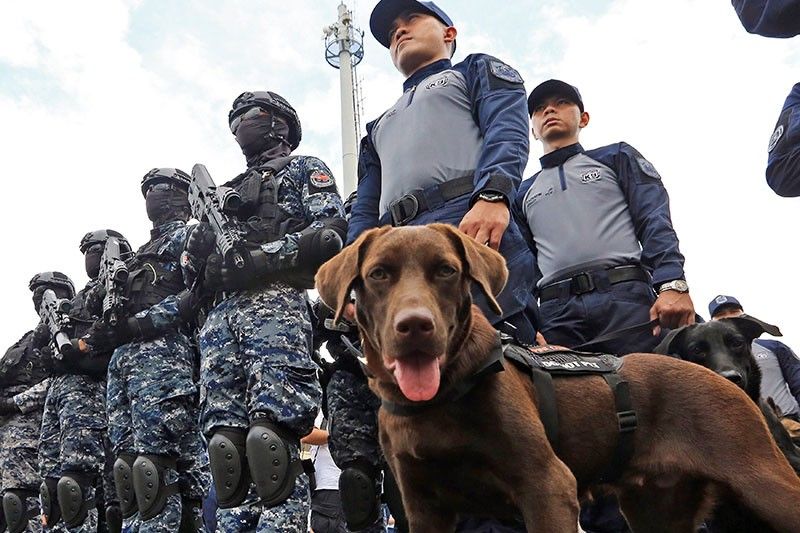PCG eyes more ASF sniffing dogs

MANILA, Philippines — The Philippine Coast Guard (PCG) is planning to replicate the success of its first African swine fever (ASF) sniffing dog in Cebu and train more canines for deployment to other areas of the country.
PCG commandant Vice Admiral Joel Garcia said yesterday that aside from bomb and drug sniffing canines, the PCG is training dogs in detecting meat and meat products infected with ASF to prevent the spread of the disease.
Garcia commended PCG-Cebu for training dogs in ASF detection, which he said resulted in the discovery and confiscation of ASF-tainted products three weeks ago.
“It started in Cebu and the training of the dogs to detect ASF was successful. Now we will continue training more dogs so they could be deployed to different seaports nationwide. This is a first in Philippine history that we trained dogs for this purpose,” Garcia said, adding their K9 unit has great potential in implementing security measures.
“The PCG has the biggest K9 institution in the country. It is the only agency that has hospitals and breeding ground in Corregidor and Romblon. Transportation Secretary Arthur Tugade has ordered the establishment of a 10-hectare K9 Academy in Clark, Pampanga to harmonize all trainings of canines in the country,” Garcia said.
He said there is a need for such facility since they learned that some private K9 agencies hired by some ports use dogs that are either too old or had substandard training. Often, these dogs are having difficulty detecting contraband like illegal drugs.
The presence of K9 dogs is vital during the holidays, such as the coming All Saints’ and All Souls’ Days, when there is an influx of passengers traveling to the provinces.
The PCG said unscrupulous individuals might take advantage of the exodus and try to sneak in ASF-tainted meat products on roll-on roll-off vessels.
Since Saturday, the PCG has been on red alert for the expected influx of passengers during the long holiday weekend. It continues to deploy sea marshals on passenger ships for the entire voyage.
Don’t bring in meat products
As Christmas season nears, returning overseas Filipino workers (OFWs) and tourists are urged anew not to bring in meat products as the Philippines continues to fight the spread of ASF.
“Please do not attempt to bring in, whether in your hand carry or check-in baggage, any meat products, because those will just be confiscated,” Noel Reyes, spokesman for the Department of Agriculture (DA0, said yesterday.
“You will just waste your effort and money because meat products will be confiscated, especially those coming from ASF-affected countries,” he added.
For those coming from countries not affected by the ASF outbreak, OFWs and tourists should present certificate or permits from the country of origin before the meat products could be allowed entry.
“They have to present a certificate declaring where it came from, including from countries without ASF such as Australia, Canada, England and the US. They have to produce documents saying and certifying that the goods they are carrying are ASF-free,” Reyes said.
The DA is urging travelers to avoid bringing in meat products to avoid hassle at the airports.
“They can bring in other pasalubong except pork and processed meat,” Reyes said.
The last incident of an OFW bringing in processed meat products was in May, wherein 32 cans of Ma Ling, a brand of luncheon meat, were confiscated.
Since last year, the Philippines has banned the importation, distribution and sale of processed pork products from ASF-affected countries.
These include Belgium, Bulgaria, Cambodia, China, Czech Republic, Germany, Hong Kong, Hungary, Laos, Latvia, Moldova, Mongolia, Myanmar, North Korea, Poland, Romania, Russia, Serbia, Slovakia, South Africa, Ukraine, Vietnam, Zambia and Zimbabwe.
Emergency employment
Labor group Buklurang ng Manggagawang Pilipino (BMP) is seeking emergency employment and other assistance for meat industry workers who are likely to be displaced due to ASF.
BMP president Leody de Guzman said while the DA is extending assistance to the meat industry, the Department of Labor and Employment (DOLE) must also provide protection for the workers.
“The DA has reported that the meat industry is losing P1 billion per month to ASF, but there is no estimate yet on how the outbreak is affecting the labor sector in terms of rotations, layoffs and extended work hours,” De Guzman said.
De Guzman said the DOLE must have prepared an emergency employment plan by this time.
He said DOLE should conduct an inventory of firms affected by the ASF outbreak, and which are planning to terminate or reduce pay of workers.
DOLE, he said, must tighten health and sanitation regulations in the agriculture and food manufacturing sector.
He said workers need a new set of occupational safety standards and health insurance coverage, given the global rise in communicable diseases.
Meanwhile, the DA will announce tomorrow the result of a test conducted on the products of Mekeni Food Corp.
The company has voluntarily recalled all its pork-based products from the market as it awaits results of further tests on Mekeni products.
Warrant
The Bureau of Customs (BOC) yesterday seized two containers filled with P3.5 million worth of alleged misdeclared pork and other meat products that arrived from China early this month.
The BOC said the smuggled goods arrived at the POM on Oct. 12 and were reportedly consigned to Jeniti International Trading, which reportedly declared the shipment as tomato paste and vermicelli and with total declared duties and taxes of P288,576.
On Oct. 25, the shipment was tagged “red” and found to be containing dimsum, dumplings, Peking duck, fresh and frozen duck desserts, pork meat and pork products, marinated chicken wings, minced vegetables with meat, egg noodles, breaded chicken fillet, fresh and frozen squid rings and frozen scallops.
This resulted in the issuance of a warrant of seizure and detention against the shipment for violation of the Customs Modernization and Tariff Act.
The BOC is leaving it up to the Bureau of Animal Industry (BAI) to determine if the seized goods are infected with ASF. – Louise Maureen Simeon, Mayen Jaymalin, Gerry Lee Gorit Eva Visperas, Raymund Catindig
- Latest
- Trending






























